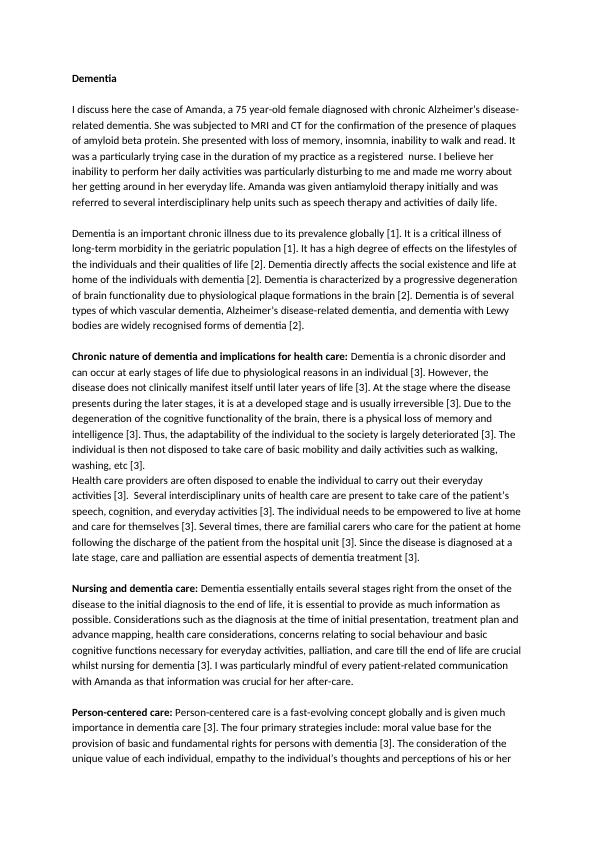Dementia- Case of Amanda
Added on 2020-02-03
3 Pages953 Words67 Views
DementiaI discuss here the case of Amanda, a 75 year-old female diagnosed with chronic Alzheimer’s disease-related dementia. She was subjected to MRI and CT for the confirmation of the presence of plaques of amyloid beta protein. She presented with loss of memory, insomnia, inability to walk and read. It was a particularly trying case in the duration of my practice as a registered nurse. I believe her inability to perform her daily activities was particularly disturbing to me and made me worry about her getting around in her everyday life. Amanda was given antiamyloid therapy initially and was referred to several interdisciplinary help units such as speech therapy and activities of daily life.Dementia is an important chronic illness due to its prevalence globally [1]. It is a critical illness of long-term morbidity in the geriatric population [1]. It has a high degree of effects on the lifestyles of the individuals and their qualities of life [2]. Dementia directly affects the social existence and life at home of the individuals with dementia [2]. Dementia is characterized by a progressive degeneration of brain functionality due to physiological plaque formations in the brain [2]. Dementia is of several types of which vascular dementia, Alzheimer’s disease-related dementia, and dementia with Lewy bodies are widely recognised forms of dementia [2]. Chronic nature of dementia and implications for health care: Dementia is a chronic disorder and can occur at early stages of life due to physiological reasons in an individual [3]. However, the disease does not clinically manifest itself until later years of life [3]. At the stage where the disease presents during the later stages, it is at a developed stage and is usually irreversible [3]. Due to the degeneration of the cognitive functionality of the brain, there is a physical loss of memory and intelligence [3]. Thus, the adaptability of the individual to the society is largely deteriorated [3]. The individual is then not disposed to take care of basic mobility and daily activities such as walking, washing, etc [3]. Health care providers are often disposed to enable the individual to carry out their everyday activities [3]. Several interdisciplinary units of health care are present to take care of the patient’s speech, cognition, and everyday activities [3]. The individual needs to be empowered to live at homeand care for themselves [3]. Several times, there are familial carers who care for the patient at homefollowing the discharge of the patient from the hospital unit [3]. Since the disease is diagnosed at a late stage, care and palliation are essential aspects of dementia treatment [3].Nursing and dementia care: Dementia essentially entails several stages right from the onset of the disease to the initial diagnosis to the end of life, it is essential to provide as much information as possible. Considerations such as the diagnosis at the time of initial presentation, treatment plan and advance mapping, health care considerations, concerns relating to social behaviour and basic cognitive functions necessary for everyday activities, palliation, and care till the end of life are crucialwhilst nursing for dementia [3]. I was particularly mindful of every patient-related communication with Amanda as that information was crucial for her after-care.Person-centered care: Person-centered care is a fast-evolving concept globally and is given much importance in dementia care [3]. The four primary strategies include: moral value base for the provision of basic and fundamental rights for persons with dementia [3]. The consideration of the unique value of each individual, empathy to the individual’s thoughts and perceptions of his or her

End of preview
Want to access all the pages? Upload your documents or become a member.
Related Documents
HNB3209 - Report on Nursing and The Communitylg...
|12
|3009
|98
Dementia: Risk Factors, Pathophysiology, and Treatmentlg...
|4
|1432
|404
Dementia: Understanding the Symptoms, Risk Factors, and Managementlg...
|7
|4666
|172
Case Study on Global Burden of Diseaselg...
|13
|3353
|14
Investigating the Use of BAN2401 (A? mAb) in Treatment of Alzheimer Diseaselg...
|10
|3149
|197
Clinical Reasoning Cycle Case Study for Nursing Professionalslg...
|10
|2625
|95
